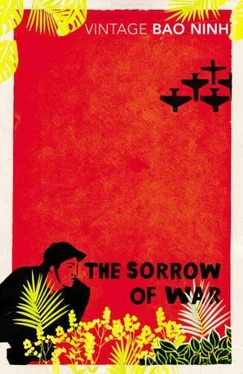It was also thanks to our mutual sorrow that we’ve been able to walk our respective roads again. Our lives may not be very happy, and they might well be sinful. But now we are living the most beautiful lives we could ever have hoped for, because it is a life in peace. Surely this was what the real author of this novel intended to say?
However, the sorrows of war had been much heavier for this author than they had been for me. His sorrows prevented him from relaxing by continually enticing him back into his past.
Perhaps that was not completely true. It may have been just an impasse of pessimism. Then again, his life may have been devoid of spiritual hope. Even so, I believe he derived some happiness from looking back down the road of his past.
His spirit had not been eroded by a cloudy memory. He could feel happy that his soul would find solace in the fountain of sentiments from his youth. He returned time and time again to his love, his friendship, his comradeship, those human bonds which had all helped us overcome the thousand sufferings of the war.
I envied his inspiration, his optimism in focusing back to the painful but glorious days. They were caring days, when we knew what we were living and fighting for and why we needed to suffer and sacrifice.
Those were the days when all of us were young, very pure and very sincere.
‘The violent upheavals of war have given painful birth to many outstanding works of literature, ranging from The Naked and the Dead to the Poems of Wilfred Owen. To these must now be added Bao Ninh’s The Sorrow of War .’
Economist
‘ The Sorrow of War is a more complete and humanly engaging work of fiction than any written by an American about Vietnam. Its success derives largely from its formal inventiveness. Ninh’s multi-faceted approach to his material is a courageous and deliberate attempt to discover ways of overcoming its power to terrify and dehumanise… This unforced patterning allows him to describe terrible events without hysteria or evasiveness.’
London Review of Books
‘ The Sorrow of War is a profound and tragic account of a survivor. At times lyrical and bleak, frequently intense and gruesome and occasionally blackly humorous, it reminds the reader that the scars of war are universal, and do not disappear with the signing of treaties.’
Eastern Express
‘A masterpiece of a novel; a brutal and shocking book of resistance, a mystical journey through the Vietnamese landscape, a tragic love story of lives torn apart by war… A bestseller in Vietnam; it deserves to be the same here.’
Militant
‘A novel of international significance: literate, highly readable, and immensely powerful.’
The List
‘As a testament to war in general and the Vietnam war in particular it is without parallel.’
Labour Briefing
‘The Vietnam war has been burned in our minds through a plethora of film and fiction but none has succeeded in translating so haunting and tragic a message as Bao Ninh’s first novel.’
Yorkshire Post
‘There are many Americans who have written along similar lines of memory and recall dreadful war and disappointing peace; but surely none has got so near to the truth as Bao Ninh. Any veteran of any war will identify with his inner struggle, and any woman who has seen her man go off to the front will be able to suffer with Phuong. This book should be required reading for anyone in American politics or policy-making.’
Tim Page,
Guardian
‘A rare corrective to the overwhelming American literature of the war. As an informative contrast The Sorrow of War is valuable. It floats in place and time, shifting smoothly between personal memories of pre-war days and detached accounts of combat. Moving between poetic licence and understated description, it has a post-war calm and sadness.’
Times Literary Supplement
Bao Ninh was born in Hanoi in 1952. During the Vietnam war he served with the Glorious 27th Youth Brigade. Of the five hundred who went to war with the brigade in 1969, he is one of ten who survived. A huge bestseller in Vietnam, The Sorrow of War is his first novel.

This eBook is copyright material and must not be copied, reproduced, transferred, distributed, leased, licensed or publicly performed or used in any way except as specifically permitted in writing by the publishers, as allowed under the terms and conditions under which it was purchased or as strictly permitted by applicable copyright law. Any unauthorised distribution or use of this text may be a direct infringement of the author’s and publisher’s rights and those responsible may be liable in law accordingly.
Version 1.0
Epub ISBN 9781448105595
www.randomhouse.co.uk
Published by Vintage 1998
24
English translation copyright ©Martin Secker & Warburg 1993
This book is sold subject to the condition that it shall not, by way of trade or otherwise, be lent, resold, hired out, or otherwise circulated without the publisher’s prior consent in any form of binding or cover other than that in which it is published and without a similar condition including this condition being imposed on the subsequent purchaser
Originally published as Thân Phân Cua Tinh Yêu by Nhà Xuät Ban Hoi Nha Van (Writers’ Association Publishing House, Hanoi, 1991)
First published in Great Britain by
Martin Secker & Warburg Limited in 1994
Vintage
Random House, 20 Vauxhall Bridge Road,
London SW1V 2SA
www.rbooks.co.uk
Addresses for companies within
The Random House Group Limited can be found at:
www.randomhouse.co.uk/offices.htm
The Random House Group Limited Reg. No. 954009
A CIP catalogue record for this book is available from the British Library
ISBN 9780749397111















